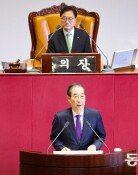N. Koreans talk of cultural differences
N. Koreans talk of cultural differences
Posted August. 17, 2000 12:05,
Among the North Korean family reunion visitors to the South, the more scholarly members of the delegation have pointed out what they personally perceived as drawbacks of South Korean society.
Of the various corruptions of the South`s social fabric, one which many deemed serious was the overuse of foreign terminology. "The Korean language spoken in the South contains too many foreign language terms," Yoo Yeul, 82, a famous scholar of Korean language, said. "The (outlandish) clothes of the people seem to reflect the language. The clothes worn by South Korean women are neither traditional clothes nor Western. It appears to be some rag-tag mixture."
Kim Yong-Hwan, 68, the North Korea Red Cross assistant director of distribution was puzzled by the name of the delegation¡¯s hotel. "I`ve heard that the hotel we are staying in, Walker Hill, is from the name of a general who fought during the Liberation War (Korean War)," Kim said. "I can`t figure out whether this is a compound word of `someone who walks¡¯ and ¡®hill,¡¯ and what it means. How would anyone know that it is a hotel name?¡±
"The name Olympic Parktel, where the South Korean family members are staying, also is very vague," he continued "In the North, our motels are named, Motel 1, Motel 2 and so on. Anyone who sees and hears the name automatically understands what the place is." The criticisms clearly make visible the differing ideology on the use of language.
Park Sup, 74, an actor who starred in the "Sea of Blood" in the North, voiced his view concerning the shik-hae, a beverage made from rice and honey, offered him at the Lotte World Traditional Museum. "There were a few beverages made of dried persimmon and other fruits in cans at the family reunion tables on August 15," he said. "Our traditional food should be consumed our way rather than opting out for convenience. Otherwise, the food or drink loses favor. The shik-hae should be served in brass or ceramic. Beer is the only beverage fit for cans."
Cho Jin-Yong, 69, a script writer and famed author of "The Way," which was based on the hope of national reunification, spoke after a sightseeing tour of the museum. "Although there are many historically valuable lessons to be learned in the museum, a large segment of Korean history is missing," Cho said. "To exchange the missing aspects of Korean history such as the Eastern Studies Reformation and others achievements of the people, it would be good to have built a joint museum."






